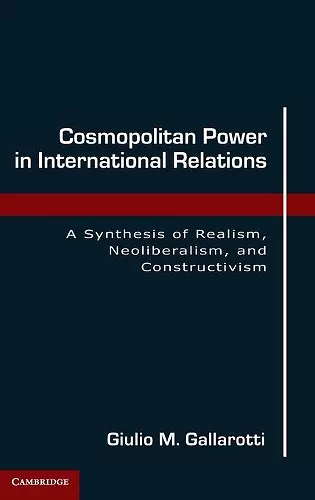Cosmopolitan Power in International Relations
A Synthesis of Realism, Neoliberalism, and Constructivism
Format:Hardback
Publisher:Cambridge University Press
Published:18th Oct '10
Currently unavailable, and unfortunately no date known when it will be back
This hardback is available in another edition too:
- Paperback£30.00(9780521138123)

True national power in the modern world is only delivered through combining traditional means of power with more enlightened means.
True national power in the modern world can only be delivered through combining traditional means of power with more enlightened means: diplomacy, cooperation, and a positive image. Only through a combination of strategies can nations achieve their greatest possible strength.How can nations optimize their power in the modern world system? Realist theory has underscored the importance of hard power as the ultimate path to national strength. In this vision, nations require the muscle and strategies to compel compliance and achieve their full power potential. But in fact, changes in world politics have increasingly encouraged national leaders to complement traditional power resources with more enlightened strategies oriented around the use of soft power resources. The resources to compel compliance have to be increasingly integrated with the resources to cultivate compliance. Only through this integration of hard and soft power can nations truly achieve their greatest strength in modern world politics, and this realization carries important implications for competing paradigms of international relations. The idea of power optimization can only be delivered through the integration of the three leading paradigms of international relations: Realism, Neoliberalism, and Constructivism.
'In this well-argued and thoroughly researched book, the author makes a compelling case for both the importance of soft power in international relations and the deep historical roots of the concept. It is recommended reading for both scholars and policy makers.' David A. Baldwin, Princeton University
'Combining political philosophy, history, and current international politics, Gallarotti has written a penetrating analysis of the central questions of the forms and use of power. His book shows familiar authors in a new light, makes us re-think much conventional wisdom, and brings complex concepts to bear with great skill.' Robert Jervis, Columbia University
'Giulio Gallarotti makes a major contribution to the study of power (hard, soft, smart) and relates each type of power to the dominant paradigms (realism, liberalism, cosmopolitanism) that shape our understanding of international relations. This is a very thought-provoking book.' Joseph S. Nye, Harvard University
'Finally: a hard look at soft power. With some attention to Gramscian ideas about hegemony and constructivist ideas about the 'power' of norms, Gallarotti cleverly stages a confrontation between realism and liberal institutionalism, in which realists are exposed for emphasizing the importance of 'hard power' in theory, all the while accommodating the reality of soft power in their empirical assessments of world politics.' Nicholas Onuf, Florida International University
'Many international relations specialists draw piecemeal on all three of the reigning paradigms - realism, liberalism, and constructivism. But few try to think systematically about how to integrate their seemingly divergent insights in a way that makes sense as a whole. Gallarotti takes a long overdue step in that useful direction.' Jack Snyder, Columbia University
ISBN: 9780521190077
Dimensions: 235mm x 159mm x 21mm
Weight: 570g
326 pages